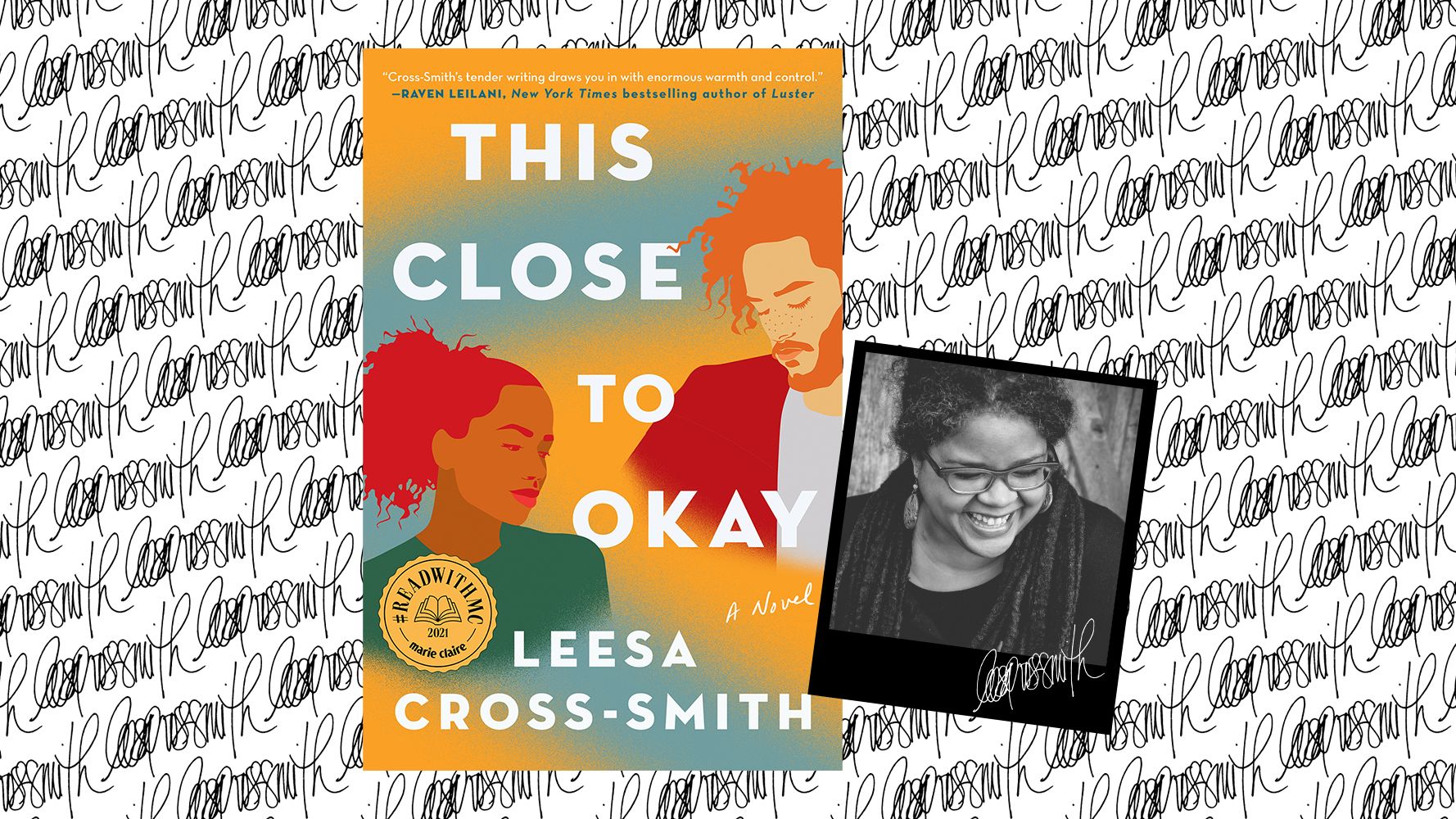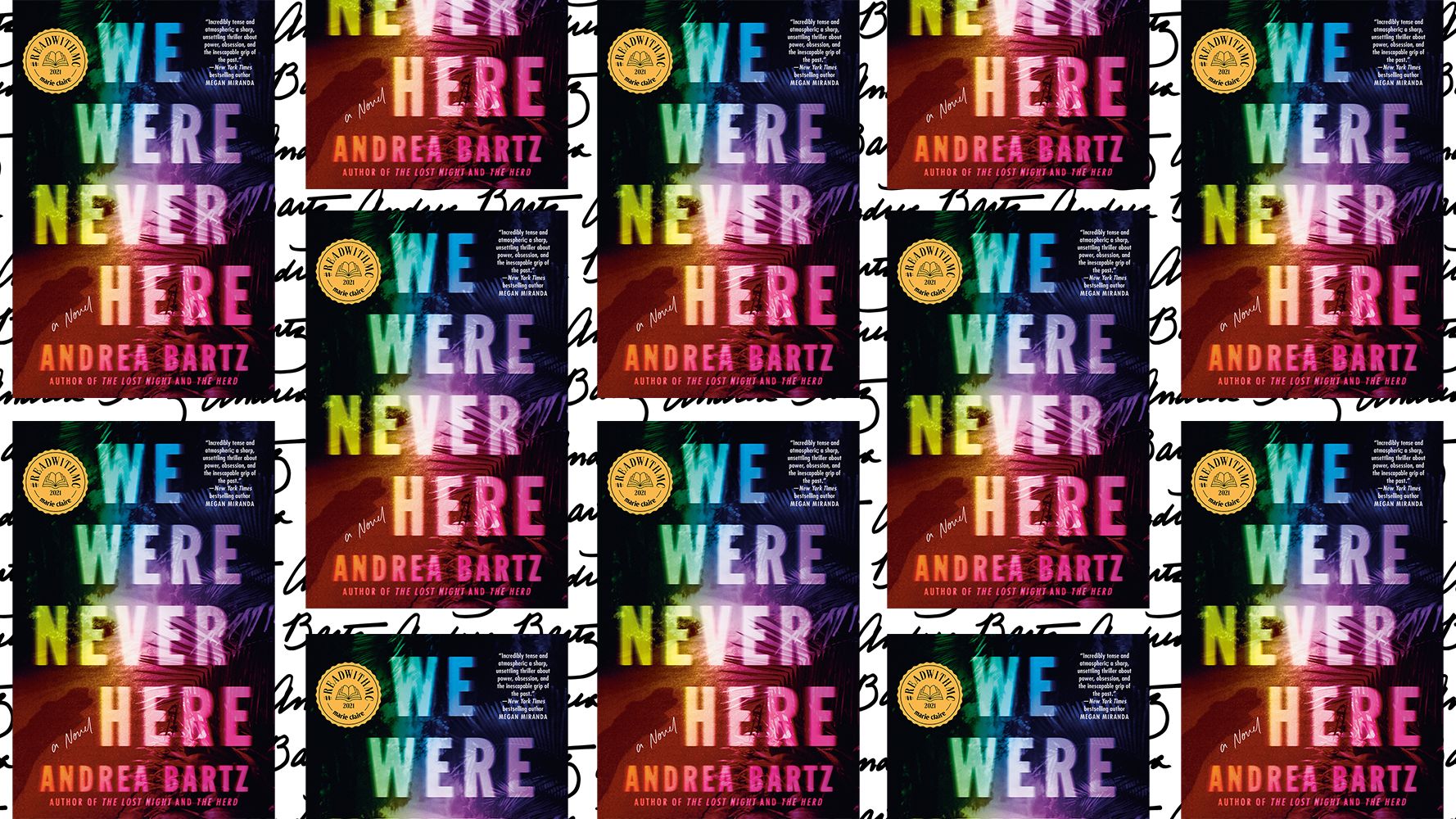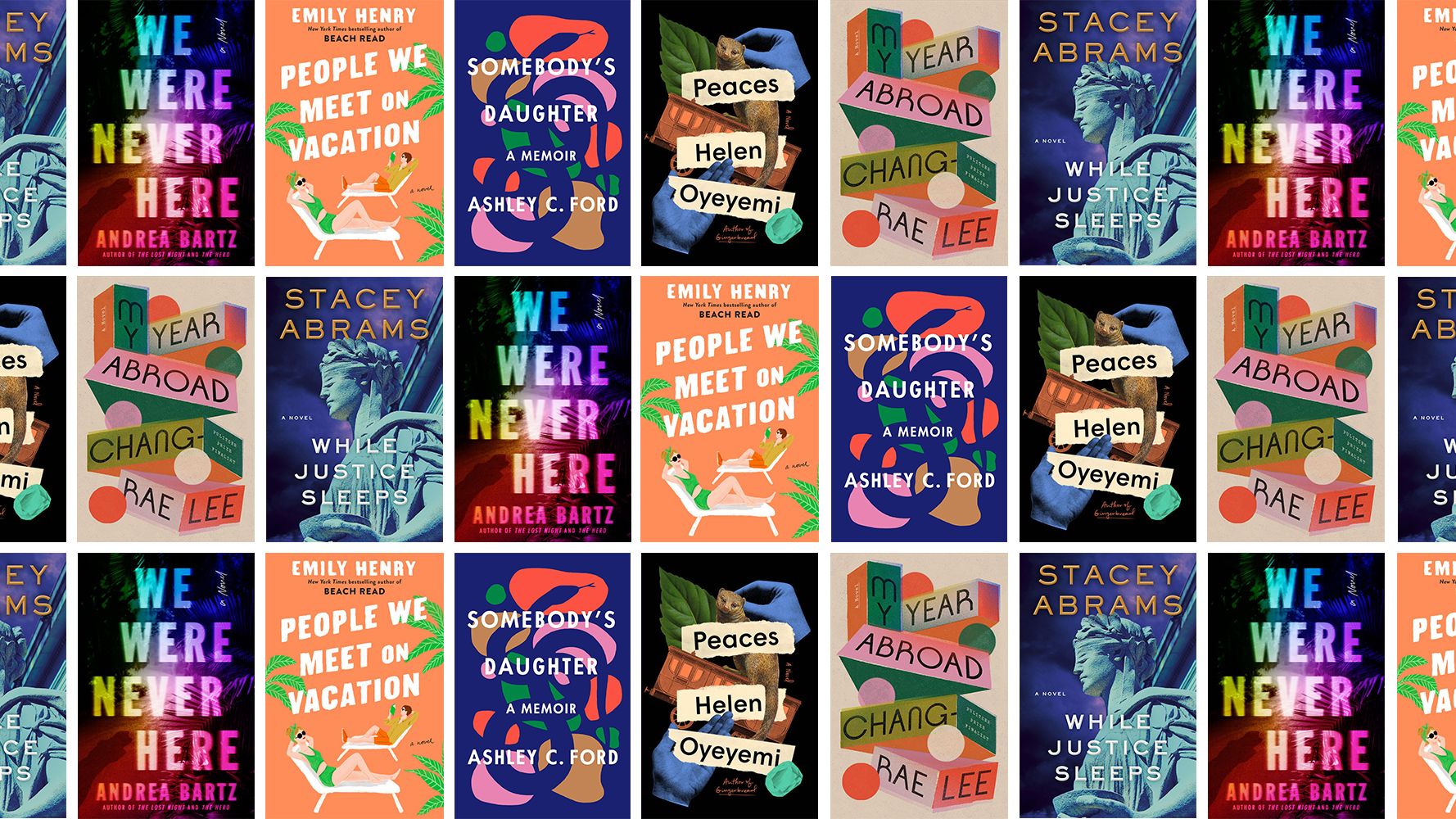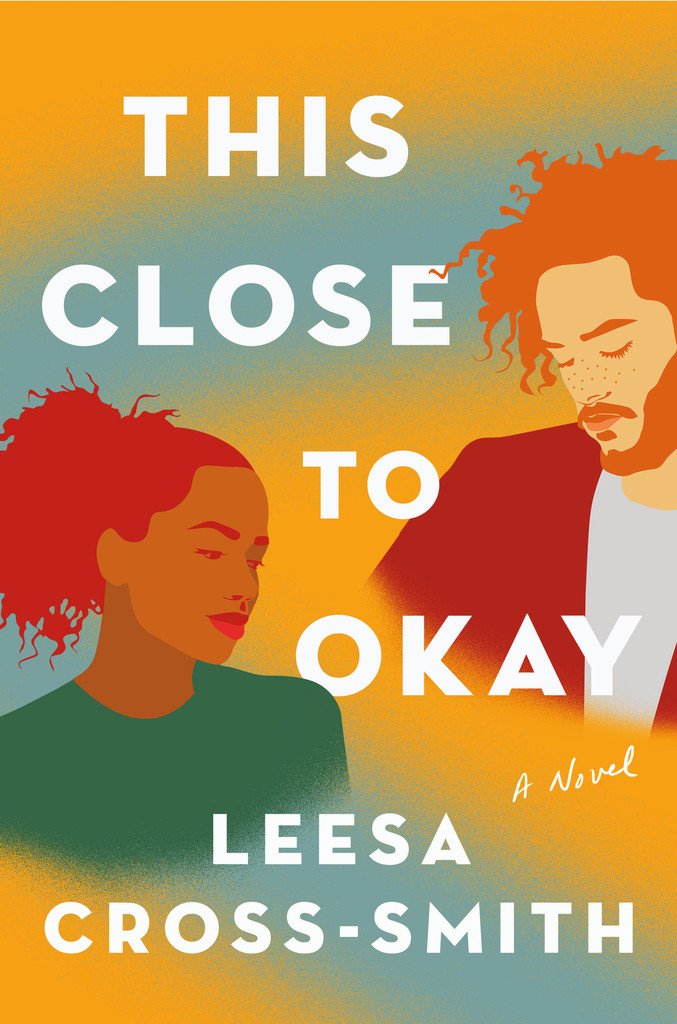'This Close to Okay' Is Our March Book Club Pick
Read an excerpt from Leesa Cross-Smith's novel, here, then dive in with us throughout the month.


Welcome to #ReadWithMC—Marie Claire's virtual book club. It's nice to have you! In March, we're reading Leesa Cross-Smith's This Close to Okay, a story told in alternating perspectives about two strangers who spend a life-changing weekend together after one of them saves the other from a suicide attempt. Read an excerpt from the book, below, then find out how to participate in our virtual book club here. (You really don't have to leave your couch!)
Trigger warning: This passage contains descriptions of a suicide attempt.
Tallie saw him drop his backpack and climb over the metal railing, the bridge. The gray Ohio River below them, a swift-rippling ribbon. She was driving slowly because of the rain, the crepuscular light. She didn’t give herself time to think. Pulled over, lowered the passenger-side window, and said hey.
Hey!
Hey!
The heys increased in frequency, volume. To her left, the blur of traffic. She punched her hazards, climbed over the armrest and out of her car, leaving the passenger door peeled open.
“Hey! I see you! You don’t know me, but I care about you! Don’t jump!” she said, loud enough for him to hear, but she didn’t want to startle him, either. The cars and trucks were loud, the rain was loud, the sky was loud, the bridge was loud—all those sounds echoing off it, rattling down and back up. The world was so loud.
He turned slightly, his face wet with rain.
Get exclusive access to fashion and beauty trends, hot-off-the-press celebrity news, and more.
“Hi. I’m Tallie,” she said. “I don’t want you to do this. Is there somewhere I can take you instead? And I could take your backpack. What’s your name?” She was reluctant to touch the backpack. It was dark green and dirty. She reached for it.
“Don’t touch it,” he said softly. Far too softly for someone who was about to jump to his death. Why bother speaking softly when death is slipping its hand in your pocket?
Tallie put her hands out in front of her, surrendering. She wouldn’t touch the backpack. Fine. A blessing.
“I’m sorry. Is there somewhere I could take you and maybe we could talk? Or I could call someone for you? Come with me. We can figure it out,” she said, her voice climbing a rickety set of stairs.
She’d almost forgotten she was a licensed therapist until she said those words. We can figure it out. And how often did licensed therapists get to do surprise on-the-street sessions? A lot, actually. But this one was on-the-bridge. She’d never lost a client to suicide, and she wasn’t going to start now. He wasn’t her client, but he could’ve been. She began speaking to him as if it were true.
Instead of being out in the cold rain, she imagined they were in her cozy office with the calming lapis walls, the white-noise machine, her chair—a basil green. The shiny, honey-smooth hard- wood floors; the soothing, soft almond suede couch. She had a scented-oil diffuser on a table by the window—lavender and a hint of lemon; she’d mixed it herself. There were potted spider and dracaena plants, bamboo palms, a Monstera, succulents in the sunlight—natural air purifiers. The bookshelves were packed neat and tight, with an amber salt lamp atop the one closest to the door. She pictured her office perfectly, transported herself there in her mind, willed that calm into her voice. Her receptionist’s fingers gently clicked the computer keyboard, the rocky fountain bubbled in the waiting room.
Her older brother, Lionel, was a big-shot finance bro and had given her the money to design everything so beautifully from scratch; it made her feel guilty, like she could never do anything so important and pretty for him. She didn’t want the man on the bridge to know she was a therapist with a rich big-shot brother and a calming office just yet, because that would separate them. She wanted him to think and know she was like him; they were the same. She had her share of want-to-jump days like everyone else, just had never made it over the railing before.
“No, thanks. Leave me alone,” he said politely. Too politely for death. He hadn’t completely made his mind up yet.
“I’ve had some shitty days, too. Some really shitty days. I just went through a divorce, and before the ink was dry, I found out my ex-husband got his mistress pregnant. I can’t have babies, so it was literally the worst thing that could’ve happened to me. He’s with her now, and they have a little girl. They moved to Montana to be closer to her family. Who lives in Montana? I can’t even remember where it is half the time,” she said, hating that she’d used the word mistress. She usually tried to avoid it, knowing how it cast a spell she didn’t intend. Mistress—with its snaky curves and Marilyn Monroe breathiness—implied so much drama and romance that it seemed desirable.
“I’m sorry that happened to you,” he said and paused, “but lots of people live in Montana. It’s a regular state. I have friends who live there.” His voice snapped. Politeness averted.
He was looking down at the river. It was cold and getting colder. Late October, the nights were getting longer. That alone made Tallie start to question whether life was worth living—God turning out the lights. Autumn was okay, but winter? Winter was too brutal to tackle alone, and this would be the second winter since her divorce. Joel would be spending winter in Montana with his new wife and baby.
“Right. I’m sure Montana is fine. Um, you said you had friends there. Why don’t you come over to this side and tell me about your friends?” Tallie said, stepping closer to him.
He looked at her before giving his attention back to the river. It was the first time she’d seen his face full on. He had a smattering of light freckles, like someone had accidentally spilled cinnamon across his nose and cheeks, and he was wearing a jacket the same color as his backpack. Both his jeans and boots: syrupy brown. Shattered energy seemed to pulse from him like sonar. Tight blips of loneliness. Tallie translated the echolocation easily. She was lonesome and blipping, too.
“We should call them. I bet they’d love to hear from you,” she said, moving closer and going into her pocket for her phone. “What are their names?”
“I don’t want to talk to them right now.”
“You won’t tell me your name or how I can help you?”
“No, thank you.”
“All right. Okay,” she said, tapping around on her phone, wondering if there was something she could find that might help. She glanced at her car, the open door, the rain falling sideways against the seat. The dome light glowed a blurred white. She wiped her fingers dry, tapped around more.
“Have you heard this song? I love this song,” she said, turning it up, stepping closer to him.
She was on the safe side of the railing; he was on the suicide side. She doubted he would be able to hear the music. It was a loud world. She was only a bit surprised no one else stopped, no one else pulled to the side and said hey. Everyone always thought everyone else would take care of things.
“A Nervous Tic Motion of the Head to the Left” by Andrew Bird played from her phone. She thought past the title having the word nervous in it, but early in the song he sang the word died, so she waited until that part had passed and only turned it up once Andrew Bird began to whistle. It was a quirky song with lots of whistling. She’d been flicking through the musical artists in alphabetical order and skipped ABBA, although “I Have a Dream,” with its hopeful lyrics about believing in angels, wouldn’t have been the worst choice. One scroll past ABBA was Andrew. She stretched her arm out so the phone would be closer to his ear.
“This guy. His name is Andrew Bird, and he’s whistling like a bird in this song. It’s a pretty song, but I don’t know what it means,” she said. The rain was wetting her hoodie, her cold hand, the phone. This man must’ve been freezing if he’d been on the bridge for even a short amount of time. She asked how long he’d been standing there.
“I don’t know,” he said, still looking down.
She let the song play, stopping it before Andrew Bird said the word died again. She put the phone into her pocket.
“I’m sure you’re very cold. There’s a coffee shop up the road. We could go get a coffee. I’d love to buy you a coffee. Would you let me buy you a coffee?” she asked.
He could be a murderer. He could be a rapist. He could be a pedophile on the run.
“You don’t want to tell me your name? I told you mine. I’m Tallie. Tallie Clark.”
“No,” he said. Soft. The world was loud and hard, but he was soft.
“Would you like something warm? To hold or drink? I can’t leave you here. I won’t do that,” Tallie said. She could reach out and touch him but was afraid. He could jump. He could fall. He could grab her and not let go, take her with him. She didn’t want to go.
“Play another song, please,” he said.
Tallie searched for “Jesus, Etc.” by Wilco—a song she’d always found comforting—and held her phone out for the man to take. They stood there listening to Jeff Tweedy’s flannel, languid voice together. She hugged herself for a moment, an attempt at warmth, before tucking her hands into the kangaroo pocket of her hoodie.
“Thank you,” he said, handing her the phone back once the song was over.
She looked at the highway—the flashing gloss of minivans, SUVs, pickup trucks, four-doors—no police cars, no fire trucks, no ambulances. She didn’t know what to do and told him that. Maybe it would make him feel better, knowing no one had all the answers. And if he was going to jump, he surely would’ve jumped already. Right? Right.
“You don’t have to do anything. It’s done,” he said.
“What’s done? What’s going on?”
“I don’t know,” he said.
It made her want to laugh, the humanity and honesty of him saying I don’t know. Tallie prayed to herself: Jesus, You see us. You know us. Let this man know. Let him find a reason to stay. Surround both of us. Let me be able to do this. Abide with us.
She held her hand out for him. Shaking, wet, cold. He looked at her, the river. The river, her. The backpack was at her feet. He was looking at the river, and he was looking at the river. He was looking at the river when he took her hand.
Excerpted from the book This Close to Okay: a novel by Leesa Cross-Smith. Copyright © 2021 by Leesa Cross-Smith. Reprinted with permission of Grand Central Publishing. All rights reserved.
If audio is more your thing, you can listen to the excerpt below, and read the rest of the book on Audible.
RELATED STORIES


Rachel Epstein is a writer, editor, and content strategist based in New York City. Most recently, she was the Managing Editor at Coveteur, where she oversaw the site’s day-to-day editorial operations. Previously, she was an editor at Marie Claire, where she wrote and edited culture, politics, and lifestyle stories ranging from op-eds to profiles to ambitious packages. She also launched and managed the site’s virtual book club, #ReadWithMC. Offline, she’s likely watching a Heat game or finding a new coffee shop.

